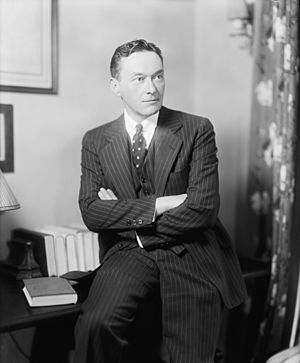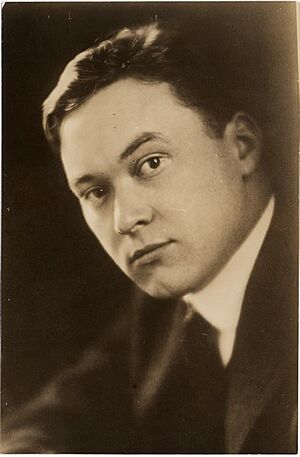Walter Lippmann facts for kids
Quick facts for kids
Walter Lippmann
|
|
|---|---|

Lippmann, c. 1920
|
|
| Born | September 23, 1889 New York City, U.S. |
| Died | December 14, 1974 (aged 85) New York City, U.S. |
| Occupation |
|
| Education | Harvard University (AB) |
| Years active | 1911–1971 |
| Notable works | Founding editor of New Republic, Public Opinion |
| Notable awards | Pulitzer Prize (1958, 1962) Presidential Medal of Freedom (1964) |
| Spouse | Faye Albertson (m. 1917; div. 1937) Helen Byrne (m. 1938) |
Walter Lippmann (born September 23, 1889 – died December 14, 1974) was an American writer and reporter. He was also a political commentator, meaning he shared his opinions on government and public issues. His career lasted for 60 years. He is famous for helping introduce the idea of the Cold War. He also created the word "stereotype" as we use it today to describe fixed ideas about groups of people. Lippmann wrote many books and newspaper columns, often looking closely at how media and democracy work. His most famous book was Public Opinion from 1922.
Lippmann also worked as a research director for Woodrow Wilson after World War I. He won two Pulitzer Prizes. One was for his newspaper column "Today and Tomorrow." The other was for an interview he did with Nikita Khrushchev in 1961. Many people called him the "most influential" journalist of the 20th century. Some even called him the "Father of Modern Journalism."
Contents
Early Life and Education
Lippmann was born in New York City on the Upper East Side. He was the only child of parents who came from Germany. His family was Jewish. His father, Jacob Lippmann, was a wealthy man. His mother, Daisy Baum, had many important friends. The family often spent summer holidays in Europe.
Walter went to the Sachs School for Boys starting in 1896. This was a private school that focused on academics. It was similar to schools in Germany. Many children from German-Jewish families went there.
Just before he turned 17, Lippmann went to Harvard University. He wrote for the student newspaper, The Harvard Crimson. He studied philosophy and languages. He could speak German and French. He was part of the Phi Beta Kappa society, which is a group for smart students.
In 1911, Lippmann worked for George R. Lunn. Lunn was the first Socialist mayor of Schenectady, New York. Lippmann left this job after four months. He felt the programs were good but not enough to be truly socialist.
Career Highlights

Walter Lippmann was a journalist and a thinker. He tried to understand how freedom and democracy could work together in a modern world. In 1913, he helped start The New Republic magazine.
During World War I, Lippmann joined the United States Army. He worked in the intelligence section in France. He also advised President Wilson. He helped write Wilson's famous Fourteen Points speech. Lippmann believed that censorship should be handled carefully. He said it should only be done by people who are fair and understand history.
Lippmann studied how newspapers reported the news. He found many mistakes and problems. In a 1920 study, he and Charles Merz said that The New York Times' reporting on the Bolshevik Revolution was biased. Besides his newspaper column, he wrote several books.
Lippmann was the first to make the phrase "cold war" widely known. He used it in his 1947 book with the same name.
He also noticed that journalists often made quick judgments about people. He said that people, including journalists, tend to believe "the pictures in their heads." This means they rely on fixed ideas rather than thinking critically. He argued that journalism was not good at truly educating the public. He believed that most readers were not interested in learning deeply about issues.
Later Life and Achievements
After the fall of Singapore in 1942, Lippmann wrote a column. He criticized imperialism and asked Western nations to support freedom for people in the East.
Lippmann also advised several U.S. presidents. On September 14, 1964, President Lyndon B. Johnson gave him the Presidential Medal of Freedom. Later, Lippmann strongly disagreed with Johnson about the Vietnam War. Lippmann was very critical of the war.
He won a special Pulitzer Prize in 1958 for his newspaper columns. The award recognized his "wisdom, perception and high sense of responsibility." Four years later, he won another Pulitzer Prize. This one was for his 1961 interview with Soviet Premier Nikita Khrushchev.
Lippmann stopped writing his newspaper column in 1967. He passed away in New York City in 1974.
Journalism and Public Opinion
Lippmann believed that news and truth were not the same thing. For him, news tells us about an event. Truth helps us understand the hidden facts and how they connect. He thought that a journalist's view of truth was personal and limited. He felt that news was "imperfectly recorded." It was too weak to be the main way for people to directly control democracy.
Lippmann thought that democratic ideals had weakened. He felt that voters often did not know much about issues. They also lacked the skills to take part in public life. In his 1922 book Public Opinion, he wrote that a "governing class" was needed. This class would help deal with new challenges.
He argued that wrong information was a natural part of how humans think. People often decide what they believe before looking at the facts. The ideal way would be to gather facts first, then make conclusions. Lippmann said that using stereotypes leads to only partial truths. He called the idea of citizens being fully able to direct public affairs a "false ideal."
John Dewey, another famous thinker, agreed that public opinion could be irrational. But Dewey did not agree with Lippmann's idea of a special group of experts leading. Dewey believed that in a democracy, the public itself should be part of the discussion. He thought that people could learn about issues and find solutions together.
Mass Culture and Society
Lippmann was one of the first to comment on mass culture. He discussed how a government could use a "propaganda machine" to help democracy work. In Public Opinion (1922), he said that ordinary people were like a "bewildered herd." He thought they needed to be guided by a "specialized class" of experts. This group of smart people would help fix the problem of citizens not knowing everything. This idea fit with the capitalism of his time, which grew stronger with more people buying things.
Later, in The Phantom Public (1925), Lippmann realized that even experts might not always know enough to act effectively. John Dewey agreed that the modern world was complex. But Dewey believed that the public could become educated and solve problems together.
From the 1930s to the 1950s, Lippmann became even more doubtful about the "guiding" class. In his 1955 book The Public Philosophy, he argued that smart people were actually hurting democracy.
Private Life
Lippmann was married twice. His first marriage was to Faye Albertson from 1917 to 1937. Faye Albertson's father was a pastor who believed in Christian socialism. Walter often visited her family's home, where they had a socialist cooperative.
After his divorce from Faye, Lippmann married Helen Byrne Armstrong in 1938. Helen had been married to Hamilton Fish Armstrong, who was a close friend of Lippmann's.
Legacy
The Walter Lippmann House at Harvard University is named after him. It is home to the Nieman Foundation for Journalism.
See also
 In Spanish: Walter Lippmann para niños
In Spanish: Walter Lippmann para niños
 | Janet Taylor Pickett |
 | Synthia Saint James |
 | Howardena Pindell |
 | Faith Ringgold |

